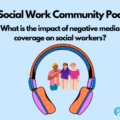
Society places an enormous onus on social work, expects it to do a very difficult job in almost impossible conditions and then screams hysterically when things go wrong.”
You would be forgiven for thinking this was written a few years – or even a few days – ago. It is, in fact, a quote from the editorial in the first ever edition of Community Care magazine, published on 3 April 1974.
As I was skimming through the musty book containing all the editions from Community Care’s first year, I was struck by two things: how much the salaries have changed – in cash terms, at least – and how little the reputation of social work has.
Social work’s negative press
Since the 1970s, social work has hit the national press time and time again, especially when a child known to social services has died.
At the same time, its successes have often gone unnoticed. For example, during the Covid-19 pandemic, among the – deserved – praise for medical staff, delivery drivers and care workers, there was little mention of the social workers, who continued carrying out in-person visits to children and adults at risk of harm.
It was into this context of suspicion, hostility and ignorance about social work that Community Care launched our Choose Social Work campaign, in June 2023.
Showing the difference social work makes
We wanted to show the side of social work that you rarely see in the media: of people like you, our readers, working alongside families and adults, supporting them to make changes to their lives; sometimes having to make difficult decisions, but not making them alone.
We wanted to challenge that common misconception, beloved by TV dramas, that social workers can swoop in by themselves and take a child away.
Instead, we have shown the reality: that social workers are part of multi-agency teams and arrangements, with schools, police, health and mental health all playing their part and sharing decision making.
As part of the campaign, four journalists from the Community Care team went to Wandsworth children’s services to shadow social workers for a day:
The day ended with me being in absolute awe of the social workers I met. The decisions, the effort, the planning that goes into their work is phenomenal and cannot be understated. We only hear of the bad stories in the mainstream news but we never hear about the children and families social workers help.”
Giving voice to those with lived experience
Another hugely important aspect of Choose Social Work was ensuring that we involved people with lived experience of services. While we did hear about poor practice and how the care system as a whole often fails children and young people, we also featured some very moving stories about times when social workers formed meaningful and long-lasting relationships with the children they worked with.
In one video that we specially commissioned for the campaign, care-experienced author and campaigner Jenny Molloy interviewed a young person, Lizzie, and her social worker, Janet, about the relationship they had built and why it was so important to both of their lives.
Dear Future Social Worker
Throughout the campaign, we have asked you to share advice with the next generation of social workers. Given the negative media coverage of the profession, it must be difficult for any sixth-former or university student, or someone considering a career change in later life, to understand what the social work role involves and how to prepare themselves for the challenges they might encounter.
We’ve been so pleased with the response to this series: three of the letters are the most-viewed pieces of the entire campaign, and they’ve been shared across social media and have caused lively discussions in the comments section. Here’s some advice from two of my favourite letters:
“I cannot claim that social work is the answer – it is a messy science at best. We deal with the complexities of the heart and of stories with no clear ending. There is never a perfect solution or a set of guaranteed outcomes. To some extent, that is a scary prospect – but it also leaves space for relationships to flourish and for people to be at the heart of every decision.”
Rebekah Pierre, social worker and BASW officer with care experience

Yewande (centre) speaking at Community Care Live
“Being a child protection social worker taught me that reward will come from seeing positive outcomes, and that you need to celebrate the small wins. Praise comes in different forms, and job satisfaction helps you to have a long lasting social work career.”
Yewande, manager and practice supervisor
Your views on Choose Social Work
The comments sections of news websites are often fairly horrifying places: I try my best never to stray ‘below the line’ on most sites.
But your comments under Choose Social Work articles have been so heartening, both for us and for the social workers and writers you have been responding to. These are some of the comments that have stayed with me:
“Dan, you have lifted my spirits after a very difficult day in social work. We need to hear more of the good social workers do. There’s plenty of it around if only ‘people’ look for it. I have been qualified for nearly 20 years. I qualified at 40. The biggest inspiration of my life IS a social worker. She too was there for me at one of the darkest times in my life when I was 14 years of age.
“I was a child in care for 18 years and had three wonderful social workers (yes, how times have changed?!!). I do actually care about the children and families I work with. I aim to do my very best – there are many like me.”
Julia, commenting on an 18-year-old’s message to social workers.
“This was one of the best and most hopeful articles I’ve read about social work. I’m studying a course at university with ties to social work and recently I’ve been having doubts about if I’m even capable enough to manage such things that this job requires. But your article here and some of the comments have taught me that I’m not alone in feeling this way and all this has touched me more than you know, so thank you and I wish you the best in your journey on this path.”
Hamzah, responding to advice for young social workers.
“This article is so powerful, incredibly sad but also empowering. We have a long way to go as a profession but we do need to work as a collective to change the narrative and prevent scapegoating.”
Ckmg, commenting on our interview with Sharon Shoesmith.
The campaign’s future

Lyn Romeo (second right), chief social worker for adults, flanked by past, present and future chairs of the Adults PSW Network. Photo courtesy of the Adults PSW network.
Over the last seven-and-a-bit months since Choose Social Work was launched, we have published more than 40 pieces of content, including written articles, podcast episodes, videos, letters and galleries.
I would love to be able to share all of them here, but it would make this already long article more like a novel. Please do take a look at the Choose Social Work page, where you can see everything we have published as part of the campaign.
In 2024, we will still be championing Choose Social Work – and we hope you will too. Please contact me on ruth.hardy-mullings@markallengroup.com if you have any questions about supporting the campaign.
Community Care’s big Five-Oh
The first edition of Community Care magazine was published in 1974 – making this year our 50th anniversary.
In the editorial in our first magazine, our then editor, Mark Allen, wrote that, “Community Care, with your co-operation, will do all it can to ensure that social workers are not made society’s universal scapegoats.”
This is as true now as it was 50 years ago. We hope that you will continue supporting us, so that Community Care is still going strong in another 50 years.
And our promise to you is that we will continue being the voice for and of social workers and champion the issues that matter to you.
How to support Community Care in our 50th year:
- Sign up to our weekly email newsletter, to stay in touch with what’s going on in the social work sector
- Forward an article you found helpful to a colleague or friend
- Consider writing for us about your experiences as a social worker





 Family help: one local authority’s experience of the model
Family help: one local authority’s experience of the model  ‘I spent the first three months listening’: how supportive leadership can transform children’s services
‘I spent the first three months listening’: how supportive leadership can transform children’s services  How senior leaders in one authority maintain a culture of excellence
How senior leaders in one authority maintain a culture of excellence  How staff support ensures fantastic outcomes for children and families
How staff support ensures fantastic outcomes for children and families  Workforce Insights – showcasing a selection of the sector’s top recruiters
Workforce Insights – showcasing a selection of the sector’s top recruiters 

 Facebook
Facebook X
X LinkedIn
LinkedIn Instagram
Instagram
Comments are closed.